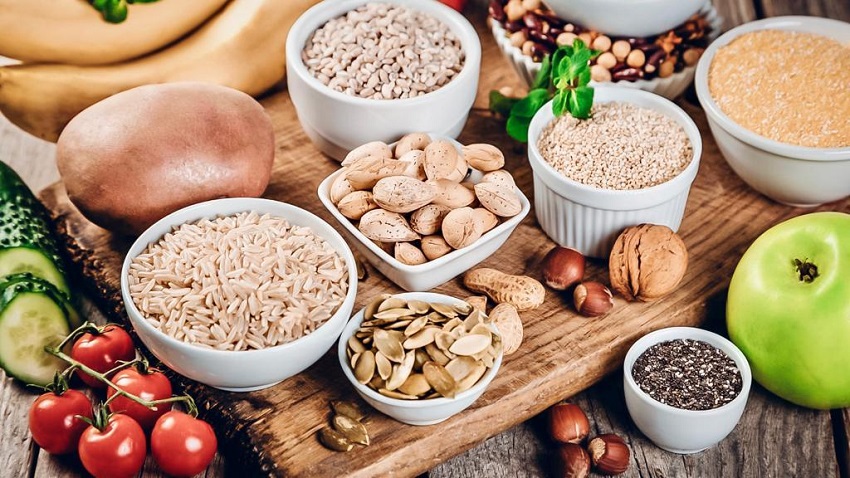What Does a Vegan Diet Consist Of?

Are you curious about what a vegan diet actually entails? Well, you’re in the right place. In this article, we’re going to explore the ins and outs of a vegan diet, from its core principles to the benefits it offers. Whether you’re considering transitioning to a vegan lifestyle or simply want to learn more, we’ve got you covered. This content is brought to you by Calvitaminsuit.com.
Understanding the Basics of a Vegan Diet
1. The Definition of Veganism
Veganism is more than just a dietary choice; it’s a lifestyle that excludes the consumption of animal products in all forms. This means no meat, dairy, eggs, or any other products derived from animals.
2. Plant-Based Focus
At its core, a healthy vegan diet is all about plant-based foods. This includes fruits, vegetables, legumes, whole grains, nuts, and seeds. These foods become the foundation of your meals.
3. Nutritional Considerations
One concern people often have about veganism is whether it provides all the necessary nutrients. With proper planning, a vegan diet can be nutritionally complete, offering essential vitamins, minerals, and proteins.
Exploring the Components of a Vegan Diet
4. Abundant Fruits and Vegetables
Fruits and vegetables are rich in vitamins, minerals, and antioxidants that support overall health. They also provide dietary fiber, which aids in digestion and helps maintain a healthy weight.
5. Plant-Based Protein Sources
Contrary to popular belief, there are numerous plant-based sources of protein. Legumes like beans, lentils, and chickpeas, as well as tofu, tempeh, and seitan, are excellent alternatives to animal-based protein.
6. Whole Grains for Sustained Energy
Whole grains such as quinoa, brown rice, and oats are complex carbohydrates that provide steady energy throughout the day. They are also great sources of fiber and essential nutrients.
7. Nuts and Seeds
Nuts and seeds offer healthy fats, protein, and various vitamins and minerals. They can be enjoyed as snacks or used to add texture and flavor to dishes.
Embracing the Benefits of a Vegan Lifestyle
8. Improved Heart Health
A well-balanced vegan diet can contribute to a healthier heart by reducing the intake of saturated fats found in animal products. This, in turn, may lower the risk of heart disease.
9. Weight Management
Many individuals find it easier to manage their weight on a vegan diet due to its focus on whole foods and lower calorie density. Plant-based meals are often rich in fiber and water content, promoting feelings of fullness.
10. Environmental Impact
Choosing a vegan diet can have a positive impact on the environment. Animal agriculture is a significant contributor to greenhouse gas emissions, deforestation, and water pollution. By avoiding animal products, you’re reducing your carbon footprint.
Addressing Common Concerns
11. Meeting Nutritional Needs
By planning meals carefully and including a variety of foods, you can easily meet your nutritional needs on a vegan diet. Supplements like B12 might be necessary, but consultation with a healthcare professional is advised.
12. Protein Sufficiency
As mentioned earlier, plant-based protein sources are abundant. Combining different protein-rich foods ensures you get all essential amino acids.
13. Enjoying a Social Life
Being vegan doesn’t mean missing out on social gatherings. Many restaurants offer vegan options, and you can get creative with plant-based dishes at home to share with friends and family.
14. Transitioning Gradually
If you’re new to veganism, transitioning gradually can be helpful. Start by incorporating more plant-based meals into your diet and explore new recipes and flavors.
In conclusion, a vegan diet is centered around plant-based foods and the exclusion of animal products. With proper planning, it can provide all the necessary nutrients while offering a range of health benefits and contributing to a more sustainable planet. So whether you’re motivated by health, ethics, or the environment, giving a vegan diet a try might just be the right step for you.
FAQs
- Can you get enough protein on a vegan diet?
Absolutely! Legumes, tofu, tempeh, seitan, nuts, and seeds are all excellent sources of plant-based protein.
- Will I need to take supplements on a vegan diet?
While a well-rounded vegan diet can provide most nutrients, supplements like vitamin B12 might be necessary. Consult a healthcare professional for personalized guidance.
- Is a vegan diet suitable for athletes?
Yes, many athletes thrive on a vegan diet. Proper meal planning ensures they get the necessary energy and nutrients to support their performance.
- How can I ensure I’m getting enough variety in my meals?
Experiment with different fruits, vegetables, grains, and plant-based proteins. Trying new recipes and cuisines can keep your meals exciting and diverse.
- What are some easy ways to start transitioning to a vegan diet?
Start by swapping out dairy milk for plant-based alternatives, incorporating more vegetables into your meals, and exploring vegan recipes online. Gradual changes make the transition smoother.




